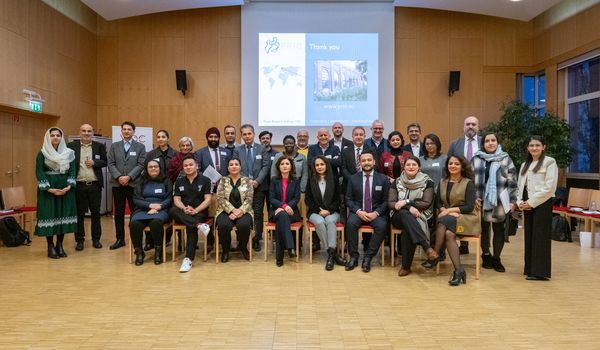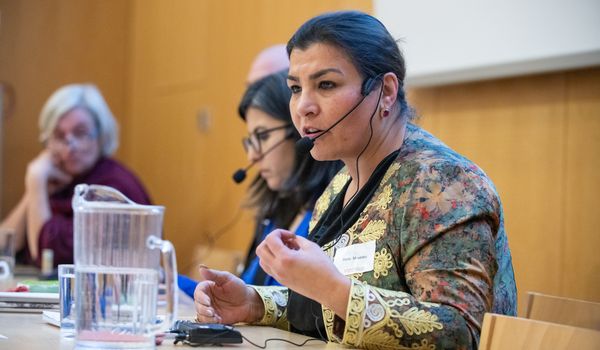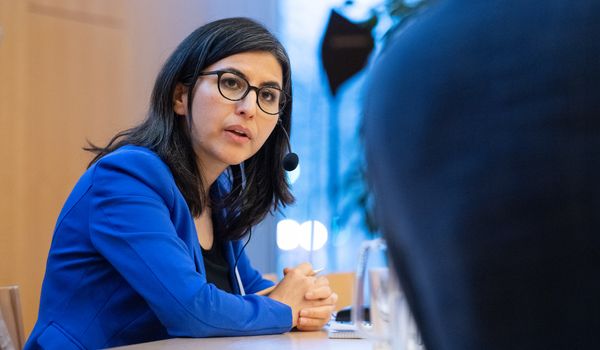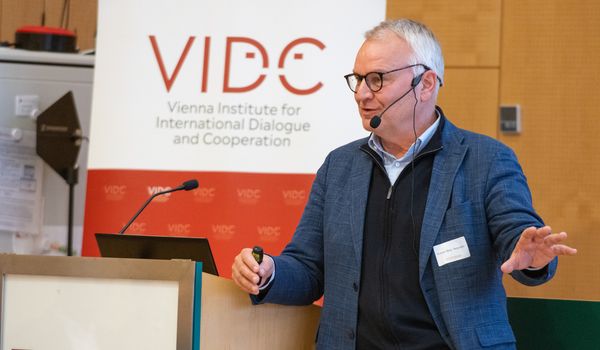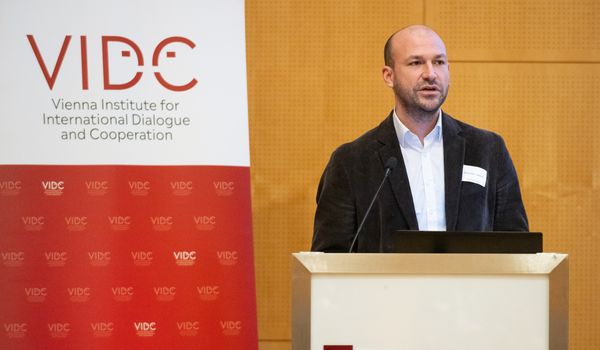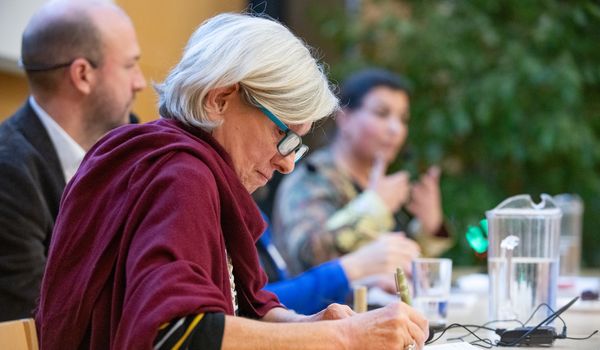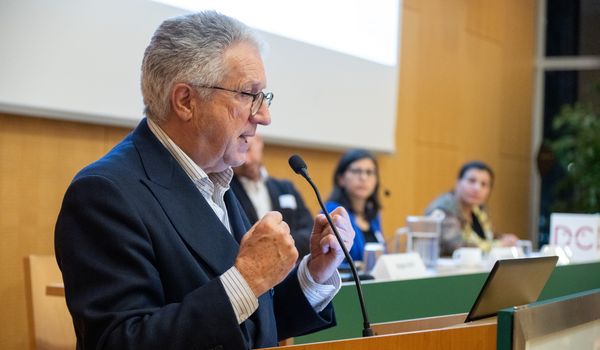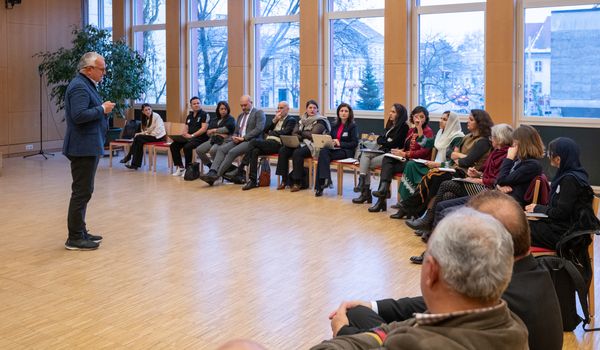In early December 2023, the VIDC convened a gathering of Afghan civil society organisations (CSOs) and diaspora groups from nine European countries. The two-day forum comprised of critical discussions on reconciliation, women’s empowerment, youth and minority participation, and the proactive role that civil society in the diaspora can play in fostering a democratic and Taliban-free Afghanistan.
The inaugural day of the forum featured insightful presentations and discussions involving international researchers and members of the Afghan diaspora. Experts such as Kristian Berg Harpviken, a research professor at the Peace Research Institute Oslo (PRIO), Maximilian Lakitsch, a lecturer in the Department of Global Governance at the University of Graz, Austria, Brigitte Rath, a founding member of the Women’s International League for Peace and Freedom (WILFP) Austria, and Horia Mosadiq, the director of the Conflict Analysis Network (CAN) and a passionate advocate for human and women’s rights, shared their perspectives. The forum also hosted Wolfgang Petritsch, president of the Austrian Institute for International Affairs, as a distinguished guest.
State-building without reconciliation?
On the forum's first day, Kristian Berg Harpviken discussed the Taliban's transformation from a resistance group to a ruling power, emphasizing challenges in their shift to governance despite prior experience. Unity is crucial for the Taliban, prioritizing internal coherence and seeking independence, distinct from perceptions as Pakistan's puppets. Harpviken highlighted their theocratic state-building, employing harsh governance tactics. The Taliban, integrating into the state apparatus, faces criticism for inflexibility in politics. Harpviken presented three approaches to deal with them: armed conflict (impractical), isolation (historically ineffective), and nuanced dialogue contingent on governance transformation (controversial).
Maximilian Lakitsch's presentation offered a broad academic perspective on reconciliation's role in sustainable peace, not limited to Afghanistan. He explored international peace practices, referencing the UN's Agenda for Peace (1992) and stressed that peace-building extends beyond ending armed violence, requiring addressing societal dynamics. Lakitsch challenged the perception of increasing global peace, linking it to unaddressed societal divisions. He emphasized the necessity of a united and reconciled society for sustainable peace, highlighting the importance of recognizing past injustices and engaging in community-driven reconciliation processes, criticizing the limitations of international peace missions and advocating for a shift towards practical, local approaches.
Wolfgang Petritsch calls for peaceful compromise in Afghanistan, emphasizing the Vienna Process for a Democratic Afghanistan. He highlights global support and inclusivity, urging recognition of Afghan aspirations. Petritsch underscores Western indifference and advocates for a democratic framework tailored to Afghanistan's context. He discusses progress and emphasizes the need for a balanced approach between civil society and political structures. Despite challenges, he asserts Afghanistan's potential for a democratic future, expressing hope for return after temporary exile.
Strengthening the voice of Afghan women
In her presentation on women's crucial role in peace negotiations, Horia Mosadiq stressed prioritizing women's interests, given their disproportionate suffering in war. She expressed skepticism about justice for human rights violations by the Taliban and international forces during two decades of NATO engagement in Afghanistan. Mosadiq called for gender apartheid recognition as a crime against humanity, labeling the Taliban as gender oppressors. Despite frustration with international institutions, she urged continued engagement to address Afghanistan's pressing issues. Reflecting on her advocacy for women's inclusion in the US-Taliban peace talks, she lamented being excluded despite sincere intentions for peace. Mosadiq rejected the acceptance of the Taliban, warlords, and those causing devastation, emphasizing the urgency to listen to her pleas for a different course of action.
Brigitte Rath, a founding member of WILFP Austria, discussed the organization's diverse activities, emphasizing women's empowerment, notably in its Afghan women's group. WILFP, established in 1915, aims to prevent wars, promote disarmament, and foster sustainable peace rooted in justice. Despite financial constraints, in August 2023, WILFP urged the Austrian government to provide asylum for persecuted Afghan women and girls, demonstrating grassroots impact through a €6,000 project supporting vulnerable women and families in Afghanistan. Rath concluded with the powerful statement, 'Peace is life.'
Recommendations from the conference
Three key issues were covered on the second day of the forum: a) fostering trust-building, social healing and reconciliation; b) women’s empowerment and participation; human rights for everyone; and d) youth engagement and the involvement of minority groups in the peace process.
1. Trust-Building, Social Healing and Reconciliation
The group proposes trust-building mechanisms for Afghan reconciliation, advocating for diaspora-led initiatives. Recommendations include ownership of trust-building processes, avoiding foreign intervention, and prioritizing Afghan leadership. Collaboration with international NGOs, networking to leverage resources in European countries, and creating trustworthy diaspora organizations are emphasized. Additionally, the recommendations highlight the importance of media and online platforms for peace journalism and active diaspora participation. The overarching goal is a comprehensive, diaspora-driven approach to achieve a peaceful Afghanistan, recognizing the multifaceted challenges and promoting unity based on common objectives.
2. Women’s Participation and Empowerment, Ensuring Human Rights for All
Recommendations include prioritizing women in negotiations between the West and the Taliban, pressing for accountability. Advocates suggest challenging the Taliban through a legal framework, drawing on examples from countries like Indonesia and Malaysia to promote women's education. Creating a donation box for diaspora members to contribute during emergencies and incorporating local tools to enhance women's financial resources is proposed. The Afghan diaspora is urged to create a cohesive narrative for Afghanistan's future governance and establish a platform for collective action. Concerns are voiced about the international community, with an emphasis on Afghan-led solutions, inclusive narratives, and broadening the focus on women's rights as fundamental rights.
3. Youth Engagement and Minority Group Participation in the Peace Process
Recommendations call for systematic use of online platforms to counter Taliban narratives and foster understanding of Afghan culture. Establishing a structured civil society group for advocacy, scholarship programs, and educational content dissemination is crucial. Mobilizing diaspora resources strategically, bridging gaps between host nations and Afghan communities, and increasing intercultural programs, including language courses, are emphasized. To prevent mass migration to Europe, EU states should address Afghanistan's challenges, allocate more resources, provide psychosocial support, and combat discrimination. Participants stress direct communication with the Afghan diaspora and highlight unity's vital role in effective engagement.

